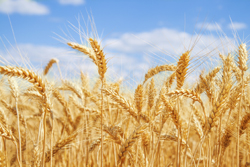Growing robuster wheat
Extending previous research accomplishments, members of the 'Modern approaches for career development in small-grain cereal breeding' (CAREBREED) project sought to further analyse important regions of the wheat genome. This line of inquiry relates to the identification of yield and other important agronomic traits; it is supported by molecular marker technologies, coupled with the analysis of quantitative trait loci (QTL), and association genetics. Scientists used a range of experimental studies targeting certain QTL clusters for yield and related traits. They were successful in identifying the targeted number of QTL± near-isogenic line (NILs) for most markers, with 58 QTL++ and 71 QTL-- lines identified across 14 loci. Of these, 83 NILs were phenotypically characterised under optimal conditions, allowing for the measurement of several traits expected to be associated with the QTLs and seeds collected for planned future work. To confirm retention of the QTL region of particular NILs, and to compare consistency in QTL expression between different (stress) environments, productivity traits were measured in a set of 58 NILs. The previously identified yield consistently controlled the harvest index across treatments of control, drought and ozone. Among other important project findings, CAREBREED identified two new loci that could be important for breeding future wheat genotypes for combined tolerance to drought and ozone stress. Contributing to a core European scientific agenda, project findings enhance our understanding of how wheat grain yield is regulated in different environments. This constitutes an important step towards increasing sustainable wheat production in variable environments and ensuring food security in a changing climate.

